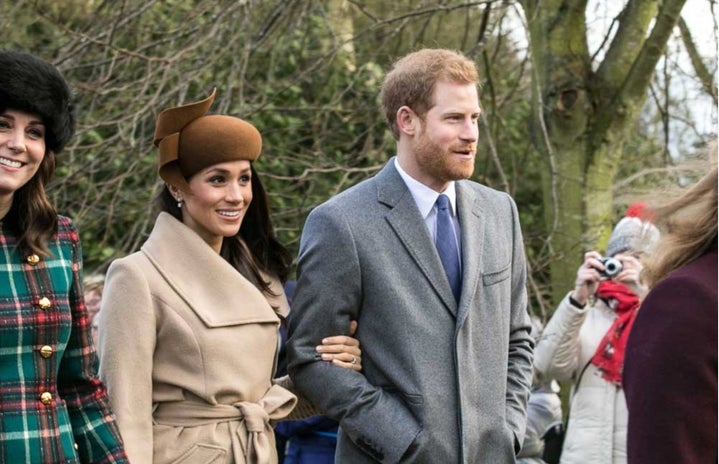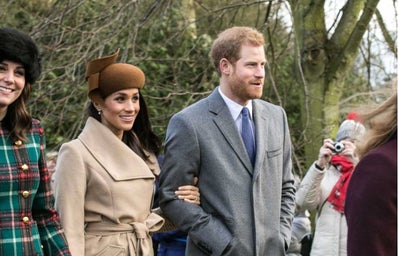There are many differing opinions about the Royal Family. Some love them and see them as a quintessential part of British culture, bringing in tourism and raising awareness for a variety of charitable causes. Some dislike what they represent; whether for economic, colonialism-related or political reasons. Others simply have no interest in what new stories the press prints about their ‘royal persons’.
But whatever your opinion on the Royal Family is, it is impossible not to admit the fact that Prince Harry, son of King Charles III, and Meghan, Duchess of Sussex, have made history by giving us a look behind the veil (much like the Wizard of Oz drawing back the curtain for Dorothy) and have played a significant role in the public’s perceptions of wealth, race, gender and mental health with the release of their Netflix documentary series ‘Harry & Meghan’ and Harry’s relatively less well-received book, ‘Spare.’
According to Netflix, ‘Harry & Meghan’ became the streaming giant’s biggest-ever documentary debut, racking up 81.55 million viewing hours internationally in the first week of its release. Despite its apparent success however, Harry and Meghan’s motivations behind the production are repeatedly quizzed by the mainstream media and the older generations. The overused argument that has been put forward is one surrounding double standards; Meghan and Harry cited privacy concerns and damaging articles from the media releasing private information about the couple’s lives – yet here they are, selling their souls to Netflix for a quick buck.
However, having watched the six-part series, it is easy to realise the motivations that resulted in its production. When asked why they wanted to make this documentary, Meghan replied, “When you feel like people haven’t got any sense of who you are for so long, it’s really nice just to be able to have the opportunity to let people have a bit more of a glimpse into what’s happened and also who we are.” She then goes on to say, “The past six years of my life, books are written about our story from people who I don’t know.”
It seems very understandable to me why the couple chose to document their lives in the last few years and work with Netflix on this production; with all the misinformation and defamatory, racially-undertone headlines about the Duchess, why wouldn’t they want to take the chance to correct the record? This is on their terms; they have chosen what information about themselves they want to release to the public, unlike with the British media, where they have no say in what is published about them, no privacy controls and, while they were part of the Royal Family, no way to combat articles that illegally breached their privacy (we all remember the publication of Meghan’s private letter to her father by the Mail on Sunday).
The couple felt the need to acknowledge these vicious journalist methods early in the relationship. In November 2016, eight days after Meghan’s relationship with Harry became public, a Statement by the Communications Secretary to Prince Harry was made, calling out ‘the racial undertones of comment pieces; and the outright sexism and racism of social media trolls and web article comments.’
Many agree with Harry’s assessment. Raven Smith wrote an article for Vogue entitled ‘Let’s Call The Endless Scrutiny Of The Duchess Of Sussex What It Is,’ in which she points out how ‘black actions are seen differently. They are scrutinised.’ There are many instances of such ‘double standards’; Smith cites how Meghan was ‘hated on’ for ‘holding her husband’s hand at his grandmother’s funeral’, but how ‘(white) Zara Tindall held her (white) husband’s hand at the same event with zero criticism lobbed at them.’
One only must type ‘Meghan vs Kate headlines’ into Google Images to be bombarded by shocking disparities between how Meghan was treated by the British Press compared to her sister-in-law, Princess Kate. The following being only one of many; ‘Not long to go! Pregnant Kate tenderly cradles her baby bump while wrapping up her royal duties ahead of maternity leave – and William confirms she’s due “any minute now”’ vs ‘Why can’t Meghan Markle keep her hands off her bump? Experts tackle the question that has got the nation talking: Is it pride, vanity – or a new age bonding technique?
Smith also writes, ‘It’s difficult not to see the racism or to explain away… the droning, relentless persecution’ for Megan ‘as anything but racial prejudice.’
Meanwhile, the Washington Post runs an article entitled; ‘Meghan and Harry called the British tabloids racist. A lot of UK journalists agree.’ In it, they assess both sides of the argument, stating that ‘Some reporters dismiss the charge of bigotry, saying the coverage of the royals can be scathing but is typical tabloid treatment when it comes to celebrities.’
This sentiment was apparently echoed by members of the Royal Family according to Harry, who stated in the Netflix documentary that; “As far as the family was concerned, everything she was being put through they’d been put through as well, so it was almost like a rite of passage. Some of the members of the family were like, ‘My wife had to go through that, so why should your girlfriend be treated differently?’ And I said, ‘The difference here is the race element.’”
However, the Washington Posts’ article goes on to recognise a letter issued by over 240 individuals who self-identified ‘journalists of colour’ which stated that Megan’s claims of racially-motivated discriminatory treatment “reflect the depressingly familiar reality of how people from Black, Asian and minority ethnic backgrounds are portrayed by the U.K. press on a daily basis.”
Further examples of derogatory and hurtful comments towards Harry’s wife can be seen by the words expressed by Jeremy Clarkson and Piers Morgan, two white British middle-aged men from relatively wealthy backgrounds compared to Meghan’s humble upbringing.
Such sexist and racially-undertoned reporting is hardly surprising though, in an industry of Journalism which is ‘94% white, 86% university-educated and 55% male’ according to a ‘damning’ survey conducted by City University London in 2016.
Jeremy Clarkson’s hateful comments on Meghan were more recently published in column in the Sun, stating that he hates the Duchess of Sussex “not like I hate Nicola Sturgeon or Rose West,” but “on a cellular level”. However, it was the following comment that resulted in 6000 complaints by members of the public; ‘At night, I’m unable to sleep as I lie there, grinding my teeth and dreaming of the day when she is made to parade naked through the streets of every town in Britain while the crowds chant, “Shame!” and throw lumps of excrement at her.’
Meanwhile, on March 2021, Piers Morgan ‘went beyond his usual campaign of hate against Meghan’ which has been widely described as ‘obsessive’, in it he claimed that she was lying when she expressed that she had experienced suicidal thoughts while being a member of the Royal Family. In a tirade against Meghan on the Good Morning Show, when his co-host expressed sympathy for Meghan and concern for any suicidal thoughts, she may have experienced, he stated, “I don’t believe a word she says.”
Individuals such as myself, an ardent feminist and non-white woman with a tumultuous relationship with mental health, can easily identify and empathise with Meghan Markle; it is inspirational and unusual to say the least to see a woman of colour who struggles with her mental health in such a high profile position not only finding the courage to speak about her experiences and raise awareness for them, but who also to doing something about it by making her voice heard and pushing an outdated system for change.
Written by: Joanna MacInnes
Edited by: Maria Rodriguez


